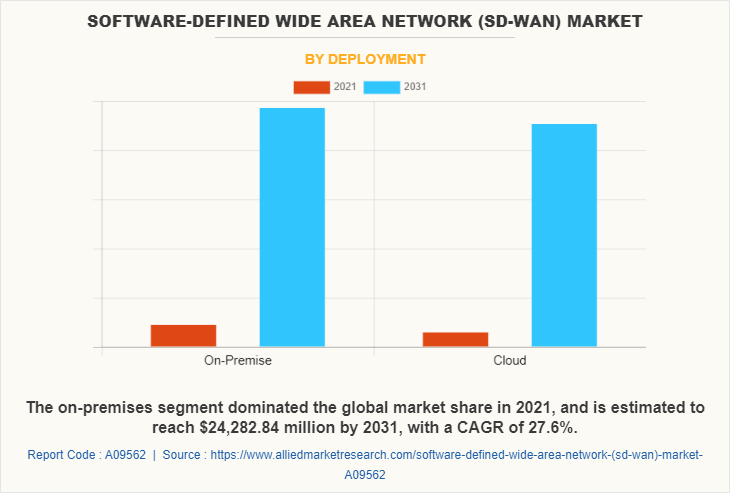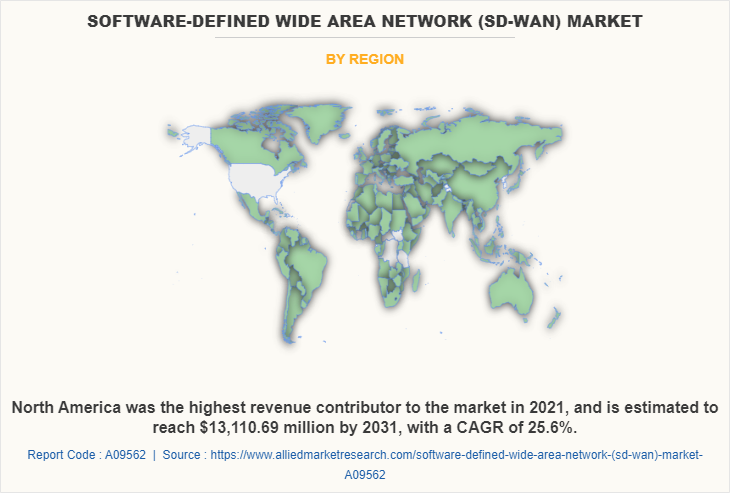Software-Defined Wide Area Network (SD-WAN) Market Insights, 2031
The global software-defined wide area network (SD-WAN) market was valued at USD 3.6 billion in 2021, and is projected to reach USD 47 billion by 2031, growing at a CAGR of 29.7% from 2022 to 2031.
Factors such as rapid digitalization and surge in adoption of advanced technologies such as IoT and cloud computing across the world are positively impacting the growth of the market. In addition, increase in adoption of SD-WAN across businesses to enhance operation & productivity is expected to propel the growth of the software-defined wide area network industry in future. Furthermore, increase in investments in sectors such as BFSI, healthcare, and other sectors are anticipated to provide lucrative growth opportunities for the market during the forecast period. Moreover, SD-WAN helps to reduce costs, improve connectivity & performance, as well as increase security & reliability for businesses, which are predicted to create numerous opportunities for market growth in the upcoming years. However, security concerns and high initial cost hamper the growth of the market.

A software-defined wide area network (SD-WAN) is a type of networking technology that uses software-defined networking (SDN) principles to manage and optimize the performance of wide area networks (WANs). It enables organizations to securely connect users, applications and data across multiple locations while providing improved performance, reliability and scalability. In addition, SD-WAN simplifies the management of WANs by providing centralized control and visibility over the entire network. Moreover, SD-WAN is designed to solve the multiple challenges associated with traditional WAN, allowing networking professionals a simpler way to optimize and secure WAN connectivity. SD-WAN is based on software rather than hardware and is configured to handle different kinds of traffic and conditions in real-time. It can adapt quickly to changing situations and offer better security and reliability than traditional WANs. Such advantages provide lucrative opportunities for the SD-WAN market growth during the forecast period.
Furthermore, SD-WAN technology is ideal for small and mid-size businesses with limited budgets, allowing access to all of the benefits of a large enterprise network without investing heavy amount. In addition, SD-WAN offers a number of benefits to large, distributed organizations with branch offices located all over the world. Hence, many organizations such as healthcare, IT, retail, and other sectors are investing in SD-WAN solution due to its benefits. This factor will create lucrative growth opportunities for the software-defined wide area network market forecast.
Segment Review
The global SD-WAN market is segmented into component, deployment mode, enterprise size, industry vertical, and region. By component, is the market is bifurcated into platform and services. On the basis of deployment mode, it is fragmented into on-premise and cloud. Depending on enterprise size, it is segregated into small- & medium-sized enterprises and large enterprises. As per industry vertical, it is classified into BFSI, IT & telecom, manufacturing healthcare, retail, government, and others. Region wise, it is analyzed across North America, Europe, Asia-Pacific, and LAMEA.

On the basis of deployment mode, the global software-defined wide area network market share was dominated by the on-premise segment in 2021, and is expected to maintain its dominance in the upcoming years. This is majorly attributed to higher security and privacy reasons. However, the cloud segment is expected to witness the highest growth, due to easy access and low costs.

By region, North America dominated the software-defined wide area network market size in 2021, due to increase in investment in advanced technologies such as SD-WAN to improve businesses and customer experience. However, Asia-Pacific is expected to exhibit the highest growth during the forecast period. This is attributed to rapid digitalization and higher adoption of IoT and cloud-based services in the region.
Key players such as VMware, Inc. , Hewlett Packard Enterprise Development LP, Cisco Systems, Inc., Nokia Corporation, NEC Corporation , Huawei Technologies Co., Ltd., Oracle Corporation, Dell, Inc., Telefonaktiebolaget LM Ericsson, Juniper Networks, Inc.
Top Impacting Factors
Rapid Digitization to Enhance Business Operations:
Software-defined wide area network (SD-WAN) plays a critical role in the digital transformation journey of an organization as it helps to reduce time and resources, as compared to the traditional software development process. Hence, with rapid digital transformation, organizations operating in the BFSI, manufacturing, automotive, energy & utilities, and several other verticals have been optimistic to adopt digital technologies to stay competitive in the market. With increase in demand for business applications across industries, the SD-WAN solution is expected to play a pivotal role in enabling quick digitization of business processes, such as sales, accounting & finance, and operations. Thus, focus on digitization fosters the growth of the SD-WAN market, globally. Furthermore, increase in penetration of cloud-based solutions & services, IoT, and AI/ML is anticipated to accelerate the software-defined wide area network market trends.
Surge in Adoption of SD-WAN Across Various Sectors:
SD-WAN serves as an ideal solution for multiple network issues that have plagued modern industries over the past few years, and as it is being increasingly adopted by several industries around the world, everyone from manufacturers to healthcare and financial professionals can improve their networking operations.
Moreover, the healthcare industry is rapidly introducing more connected devices into its health- infrastructure, which calls for increased network visibility and management. This enables the healthcare industry to retain more control over its networks and respond to demands more quickly.
Furthermore, next-generation technologies require next-generation networks that are agile, cost-effective and secure. For retailers, it is crucial to make sure that all of their shop locations are successfully networked with the corporate office, distribution, and supply chain. Due to this, many retailers are now moving forward with software-defined wide area networking (SD-WAN). As it provides an ideal solution for retail industry. SD-WAN virtualizes networks, centralizes operations and makes it incredibly easy to deploy and manage a national or global WAN.
Key Strategies/Development:
- In February 2023, Cisco Systems, Inc's Viptela SD-WAN platform is updated and deployed using the vendor’s secure access service edge (SASE) product, joining current support for Cisco’s Meraki SD-WAN platform. Customers with Viptela SD-WAN can now enjoy all the benefits of Cisco+ secure connect, and enable fast, secure private, and internet access anywhere work happens. Secure internet access secures users that are connecting to the internet, offering a common set of security tools such as firewall, secure web gateway (SWG), cloud access security broker (CASB) and data loss prevention (DLP).
- In December 2022, Cisco Systems, Inc., introduced enhanced services in the SD-WAN extension Cloud OnRamp for SaaS, which uses real-time analytics to give users the best path for application performance. The product ingests additional telemetry to provide advanced insights into network performance affecting Cisco's Webex collaboration platform.
- In December 2022, Huawei launched SD-WAN and Wi-Fi 7 Series products and innovations in Saudi Arabia at the IP Club KSA forum in Riyadh. Under the theme of intelligent cloud network, unleashing digital productivity the Huawei IP Club build an open, free, friendly thought-sharing platform for network technical supervisors, engineers, industry analysts, and key opinion leaders.
- In November 2022, VMware, Inc. unveiled its next-generation SD-WAN solution, including a new SD-WAN Client, to help enterprises more securely, reliably, and optimally deliver applications, data and services no matter where they reside to the site, branch, and home, across any network to any device. This is due to the competition, enterprises are transforming their applications, adopting multi-cloud and SaaS, and enabling users to access these applications from the office, home or elsewhere.
COVID-19 Impact Analysis
The SD-WAN market has witnessed significant growth in the past few years. The COVID-19 pandemic has increased the business need to automate processes and prioritize digital transformation initiatives. SD-WAN addresses this need, helping streamline workflows and accelerate automation projects. Furthermore, with more advanced and cutting-edge technologies becoming available every year, businesses need simple and effective methods for integrating these technologies to enhance their operations and services. Hence, SD-WAN provides the solution that can enhance business operation and help to increase work productivity. For instance, in December 2022, Cisco Systems, Inc. introduced enhanced services in the SD-WAN extension Cloud OnRamp for SaaS, which uses real-time analytics to give users the best path for application performance. The product ingests additional telemetry to provide advanced insights into network performance affecting Cisco's Webex collaboration platform. Such enhancements are anticipated to create numerous opportunities for the software-defined wide area network industry expansion.
Furthermore, businesses are shifting toward digitalization and are increasing implementation of Industry 4.0, which create the need for seamless solution and platform to meet the businesses requirements. Therefore, it increases the adoption of SD-WAN in industries rapidly, which drives the software-defined wide area network market growth.
Key Benefits for Stakeholders
- The study provides an in-depth software-defined wide area network market analysis along with the current trends and future estimations to elucidate the imminent investment pockets.
- Information about key drivers, restrains, and opportunities and their impact analysis on the software-defined wide area network (SD-WAN) market size is provided in the report.
- The Porter’s five forces analysis illustrates the potency of buyers and suppliers operating in the software-defined wide area network (SD-WAN) industry.
- The quantitative analysis of the global SD-WAN market for the period 2021–2031 is provided to determine the software-defined wide area network (SD-WAN) market potential.
Software-Defined Wide Area Network (SD-WAN) Market Report Highlights
| Aspects | Details |
| Market Size By 2031 | USD 47 billion |
| Growth Rate | CAGR of 29.7% |
| Forecast period | 2021 - 2031 |
| Report Pages | 408 |
| By Industry Vertical |
|
| By Component |
|
| By Deployment |
|
| By Enterprise Size |
|
| By Region |
|
| Key Market Players | Juniper Networks, Inc. , Hewlett Packard Enterprise Development LP, Dell, Inc., VMware, Inc. , Oracle Corporation, Telefonaktiebolaget LM Ericsson, NEC Corporation , Cisco Systems, Inc., Huawei Technologies Co., Ltd., Nokia Corporation |
Analyst Review
According to the insights of CXOs of the leading companies, over time, businesses have seen various changes in the business processes, operations, and industrial automation. This fueled the penetration of SD-WAN, as it provides a more seamless user experience for businesses that need a secure network connection.
Furthermore, SD-WAN can help to extend traditional WAN to different datacenters, branches, and public clouds automatically, thereby minimizing manual operations. Moreover, it improves performance and streamlines operations for businesses using cloud-based and SaaS applications by enabling direct connectivity to these apps. In addition, it supports remote workers who work from home or public places. It allows traffic to be restricted based on user profiles and also offers more flexibility with respect to network connectivity when compared with VPN (broadband internet, LTE, 4G, or MPLS as WAN connections). Such factors create lucrative opportunities for the SD-WAN market during the forecast period.
The CXOs further added that product launches, collaborations, and acquisitions are expected to enable companies to expand their product portfolios and penetrate in different regions. . For instance, in November 2022, VMware, Inc. launched its next-generation SD-WAN solution, including a new SD-WAN Client, to help enterprises more securely, reliably, and optimally deliver applications, data, and services no matter where they reside to the site, branch, and home, across any network to any device. This is attributed to the fact that enterprises are transforming their applications, adopting multi-cloud & SaaS, and enabling users to access these applications from the office, home, or elsewhere. In July 2021, Bharti Airtel launched advanced connectivity solutions for enterprises based on Cisco SD-WAN technology. The solution enables large and small businesses to accelerate digital transformation for their customers and allow organizations to deliver applications to users with greater visibility, security and performance. It allows enterprises to design, deploy, configure, migrate, and manage their WAN infrastructure while rapidly adapting to the real-time demands of their cloud computing, mobility, and digitization initiatives.
Global Software-Defined Wide Area Network (SD-WAN) Market is expected to reach $46,991.73 million by 2031.
The Software-Defined Wide Area Network (SD-WAN) Market is projected to grow at a compound annual growth rate of 29.7% from 2022 to 2031.
Cisco Systems, Inc., Dell, Inc., Hewlett Packard Enterprise Development LP, Huawei Technologies Co., Ltd., Juniper Networks, Inc., NEC Corporation, Nokia Corporation, Oracle Corporation, Telefonaktiebolaget LM Ericsson, and VMware, Inc. are some of the top companies.
The North America is the largest market for the Software-Defined Wide Area Network (SD-WAN)
Factors such as rapid digitalization and surge in adoption of advanced technologies such as IoT and cloud computing across the world are positively impacting the growth of the market.
Loading Table Of Content...
Loading Research Methodology...



